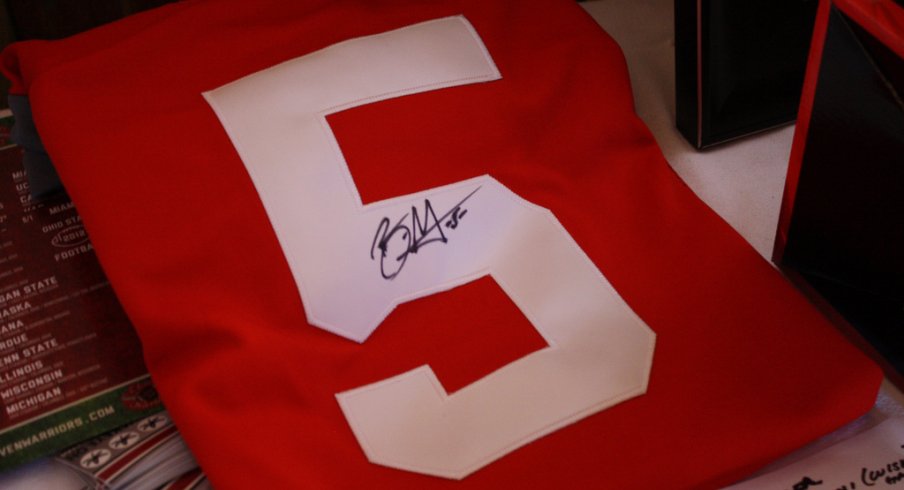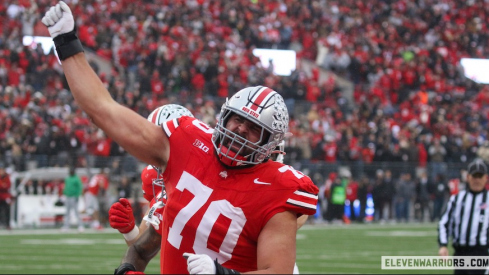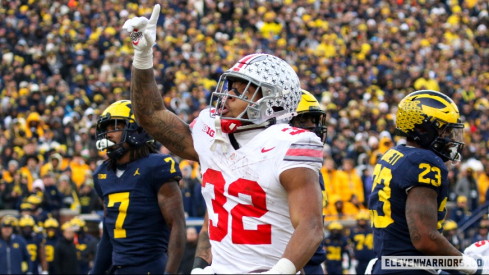If you're reading Eleven Warriors, there's a strong chance you like Ohio State sports. I too am an unapologetic Buckeye athletics homer, one as loud and boisterous as anyone. As passionate as we may be, though, the loyalty to UGA football the Georgia legislature showed by passing the "Todd Gurley" law this week blows us all away.
Todd Gurley, a star running back for Georgia from 2012 to 2014, was a preseason Heisman candidate last season. As one of the top players in the country, Gurley's memorabilia could and did fetch for a high price, and he made an easy economic decision; he made an agreement with several memorabilia dealers, who would pay him in exchange for signing jerseys, helmets, footballs and other items.
The arrangement brought Gurley good money – about $3,000 – but it also brought trouble. One of the dealers ratted him out, trying to auction off the story, and Gurley was suspended indefinitely (later reduced to four games). The case got extra attention because the dealer was a fan of a rival school, and he admitted that team rivalry played a part in his snitching.
Gurley was suspended indefinitely (later reduced to four games) for the event. The dealer has since been derided for his manipulative, vindictive behavior. Enter Georgia's House Bill 3, which punishes people who try to "bribe or entice college athletes to knowingly break NCAA rules by taking money" with a $5,000 fine and/or up to a year in jail. According to the bill's sponsor, team spirit had a lot to do with it:
Angered that a dealer — and a Florida fan at that — had not only arranged for the signature sales but then tried to sell the story to the highest media bidder, state Rep. Barry Fleming, R-Harlem, started thinking about drafting a bill to prevent future shenanigans.
"That's what really got most peoples' dander up," said Fleming, a rabid Bulldogs fan with undergraduate and law degrees from UGA. "I was disappointed when it happened. But I understand the young man comes from a very humble background. His mother didn't have funds to properly repair the roof on the trailer she raised him in."
Crafting a state law specifically to benefit players from your favorite school? That's some fanaticism. Yet it was enormously popular, as it passed through both chambers by a 193-31 margin and was signed by the governor on Thursday.
Given that Columbus's legislators like to associate with Buckeye football, it's reasonable to think we'll see a similar law in Ohio soon. This would be a mistake.
It's true that Ohio State fans are sensitive to shady dealings between our athletes and memorabilia dealers. The suspension of five Buckeyes for Tatgate, the revelations about what Jim Tressel did or didn't know, Tressel's resignation and a Never Ending Pasta Bowl of bad opinions made 2011 miserable. Even so, this is not the way to reform the system.
One key difference between similar laws in Georgia and Ohio is the fan composition in the state. Atlanta has the widest diversity of college football fans of any city in the country, while the Buckeyes dominate all regions of Ohio. The bill is intended to address fans "enticing" recruits into breaking NCAA rules, which few Ohio State fans would want to do in the case of Buckeye athletes.
The real problem is the people profiteering from resale of goods. Player memorabilia is in incredible demand, which leads to ruthlessness among dealers. The best example would be the piggish behavior of the first customers at Ohio State's spring game equipment sale: after camping out a day in advance to have pole position when the doors opened, raced to the jerseys, grabbed racks of clothing and vamoosed. They have since been reselling their goods online with a huge markup.
These are the people who are profiteering from Ohio State's athletes. This is the exploitative behavior that should be quashed, and a "Todd Gurley" law would do nothing to stop it.
OSU athletes, especially in revenue sports, are under intense scrutiny. They go through extensive compliance department training to know how to avoid memorabilia sellers, and Ohio State was a leader in monitoring athletes' bank accounts to look for discrepancies. If the university is doing its job (and it is), players know what not to do already.
Georgia's new law would be essentially worthless in Ohio: it comes too late to help Gurley, and the penalties are an emotional response to his suspension costing the Bulldogs a chance at an SEC championship.
The winners, in the case of a "Todd Gurley rule" in Ohio: the NCAA, its view of amateurism and schools' control over the market. It would do little good for players. While it might satisfy our desire for punishment, it would do nothing to address player exploitation.


